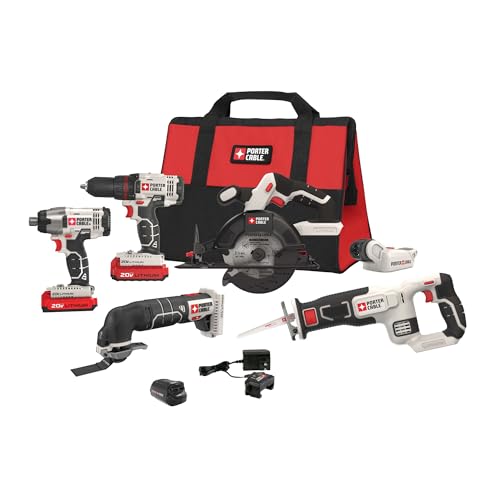There is a clear distinction between DeWalt vs Porter Cable tools, as seen in the significant price difference between the two labels.


It’s difficult to stay up to date with power tool brands unless you work in the industry full-time. Companies are selling out, shifting ownership, relocating production, and on and on.
DeWalt and Porter-Cable are both major, respected names in the business that produce advanced power tools, despite having followed very different ‘commercial’ paths over the last few decades.
DeWalt is a trusted brand from building sites to home garages, and they continue to be among the market pioneers for both DIYers and professionals. They produce some of the top equipment and tools out there.
In comparison, Porter-Cable is clearly a more cost-effective option. It would be rare to find a construction job site where the crew is working with Porter-Cable equipment. That doesn’t mean Porter-Cable is inferior by any means.
Porter-Cable tools are a good budget choice for regular, light use around the house.
So, what brand is the most suitable for your needs? See our complete tool comparison below so that you can make an educated decision.
Brief Overview: DeWalt vs Porter Cable
DeWalt and Porter-Cable are both American companies that started in the 1900s (DeWalt in 1924 and Porter-Cable in 1906). Both businesses originated on the east coast.
DeWalt began in Pennsylvania (Lancaster), and Porter-Cable started out in New York (Syracuse) by the Porter brothers and F.E. Cable.
DeWalt’s rise to fortune and fame was largely due to the company’s development of the game-changing radial arm saws, which were invented by the company’s founder, Ray DeWalt.
Porter-Cable earned a similar reputation in the 1920s, with their lineup of belt sander machines and later with the invention of the hand-held circular power saw.
The renowned Art Emmons must be mentioned when discussing the Porter-Cable brand. He managed the company’s design/engineering division for nearly forty years during the mid-1920s until he retired in the 1960s.
Emmons is known to have single-handedly built the brand into the empire seen today. He is also credited with developing electric circular saws.
After Emmons’s retirement in the 1960s, Porter-Cable was bought by the Rockwell Corporation. This acquisition affected the Porter-Cable brand.
They had to cut down on manufacturing costs and production quality to compete with Black & Decker’s line of low-cost power tools.
In the mid-80s, the business experienced a resurgence when Delta Machinery purchased Rockwell’s division of power tools. They resurrected the Porter-Cable brand, while also improving production efficiency.
Both Porter-Cable and DeWalt are now owned by the large American conglomerate Stanley Black & Decker.
The DeWalt segment continues to manufacture high-quality, cutting-edge equipment. The Porter-Cable is more of a budget division, with products designed to compete with Harbor Freight, Ryobi, and other low-cost alternatives.
Tool Comparison: DeWalt vs Porter Cable
So, let’s get down to business. After all, we’re here to discuss the power tools.
In regard to the DeWalt vs Porter Cable brands, as we described earlier, the price makes a difference.
DeWalt is top-of-the-line. We strongly suggest investing in the quality if
- you’re in it for the long run
- you intend to put your tools through a lot of wear and tear (i.e., remodeling, construction),
However, most of Porter-Cable’s cordless tools will suffice if
- you want to have some tools around your house to work with now and then
- you want to have them handy when you need them (light woodworking, repairing furniture, etc.)
For comparison, we’ll look at two DeWalt and Porter-Cable cordless tool combination kits. This would help to see what each brand has to offer, as well as understand where the big price/quality differences are.
Porter-Cable Cordless Drill Combination Kit, 6-Tool, 20V MAX (PCCK617L6)
The 20V MAX batteries are also used in DeWalt’s cordless line of tools. Is it a coincidence? Certainly not. Don’t get deceived by the names. DeWalt Lithium-Ion MAX batteries are far superior to Porter-Cable’s 20V version.
The analogy is similar to how the AA batteries from Energizer are approximately three times the price of Rayovac’s AA batteries.
This 6-tool set includes:
- 1/2″ drill
- 1/4″ impact driver (for more on drills vs. impact drivers, see here)
- Reciprocating saw
- 6 1/2″ circular saw
- Oscillating tool with variable speed for light grinding/sanding/cutting
- LED light
The kit also includes a portable dual USB charger. You can plug it into the 20V battery charger to create a remote USB charger. It’s a nice little accessory that you are able to take with you when you go out.
Porter-Cable also sells a 4-tool combination kit, which includes:
- Drill
- Reciprocating saw
- Circular saw
- LED flashlight
Also included in both kits is a Porter-Cable bag for contractors.
DEWALT Cordless Drill Combination Kit, 5-Tool, 20V Max (DCK590L2)
No products found.
The DeWalt combination kit includes the same tools as Porter-Cable:
- 1/2” drill/driver (unlike the Porter-Cable, this one is a hammer drill)
- 1/4″ impact driver
- Reciprocating saw
- 6 1/2″ circular saw
- LED light
So, what is the deal? We have two kits with similar tools, one of which is nearly twice the price.
What is the reason for this?
Pick up a 1/2” DeWalt drill, keep it down, and then hold a 1/2” Porter-Cable power drill. You’ll notice a significant weight difference right away. From the inside out, DeWalt power tools are designed with much higher-quality materials.
Their transmissions and motors have bearings made of metal. Porter-Cable power tools, while having identical torque/rpm specifications, are made of lower-quality materials. This includes nylon and high-grade plastic, instead of metals that are more expensive.
What does that imply? Most of the time, it comes down to longevity.
DeWalt tools are able to withstand much more abuse than Porter-Cable tools. As mentioned earlier, make the investment in DeWalt for construction sites or if you intend to put your tools through rough usage.
There is a significant difference in power/battery life. Despite the fact that they are both 20V batteries, the DeWalt MAX would last longer compared to the Porter-Cable ones.
Another distinction is that batteries from Porter-Cable would wear out easily. They are not able to hold the charge as long as the DeWalt batteries (hence the warranty difference).
Facilities For Production And Warranty
Porter-Cable and DeWalt outsource the bulk of their production, with assembly mostly happening in Mexico and China.
However, it should be noted that DeWalt took a significant step many years ago to bring most of their assembling back to the United States. They opened 7 brand new production plants and created several new American job opportunities.
In terms of warranty, DeWalt has a standard three-year warranty for all their power tools. This means anything that breaks or fails due to a manufacturing defect within that time period will be fixed or replaced.
Porter-Cable also provides a three-year warranty for their cordless power tools. But that applies only to the tool itself; batteries are covered for two years.
Final Thoughts
You probably came here wondering how nice Porter-Cable tools are. Or you wanted to find out the difference between DeWalt vs Porter Cable.
Hopefully, you can differentiate the two tools now and understand where the price difference comes from.
You can’t go wrong with DeWalt when it comes to professional quality, durability, and performance.
At the same time, choosing Porter-Cable for light around-the-house projects is a smart choice.
We’re DeWalt fans for sure. However, the price difference makes us question some of our assumptions. Overall, we wouldn’t hesitate to go with the Porter-Cable line of tools.
